19 February 2020
Originally published
01 October 2019
Source
For homeless people in Budapest, for migrants in Linz, for LGBTQ rights in Warsaw: How three civil rights activists are fighting moves to curtail our freedom.
A man lies on the floor and tries to fend off the fists that are beating him. This is in the centre of Warsaw, at one of the city’s busiest roundabouts. The minutes-long ordeal was 13 years ago, but it all comes back in an instant: the black leather jacket, the knuckleduster, the moment when the attacker and two other men chased him as he tried to escape by crawling along the pavement and into the bus that had just stopped nearby.
This happened to Oktawiusz Chrzanowski in his city. The city where he grew up with his parents, earned a degree in sociology and moved in with his partner. After the attack, he struggled to understand why someone would hurt another person just for being gay. What was he still doing there? Warsaw was no longer his city. Chrzanowski moved to Amsterdam with his partner. There, he learned what it’s like to really be part of a society. He realised that his sexual orientation became political in those minutes he spent on the ground in Warsaw. When Chrzanowski and his partner moved back to Warsaw in 2010, he turned his activism into a career.
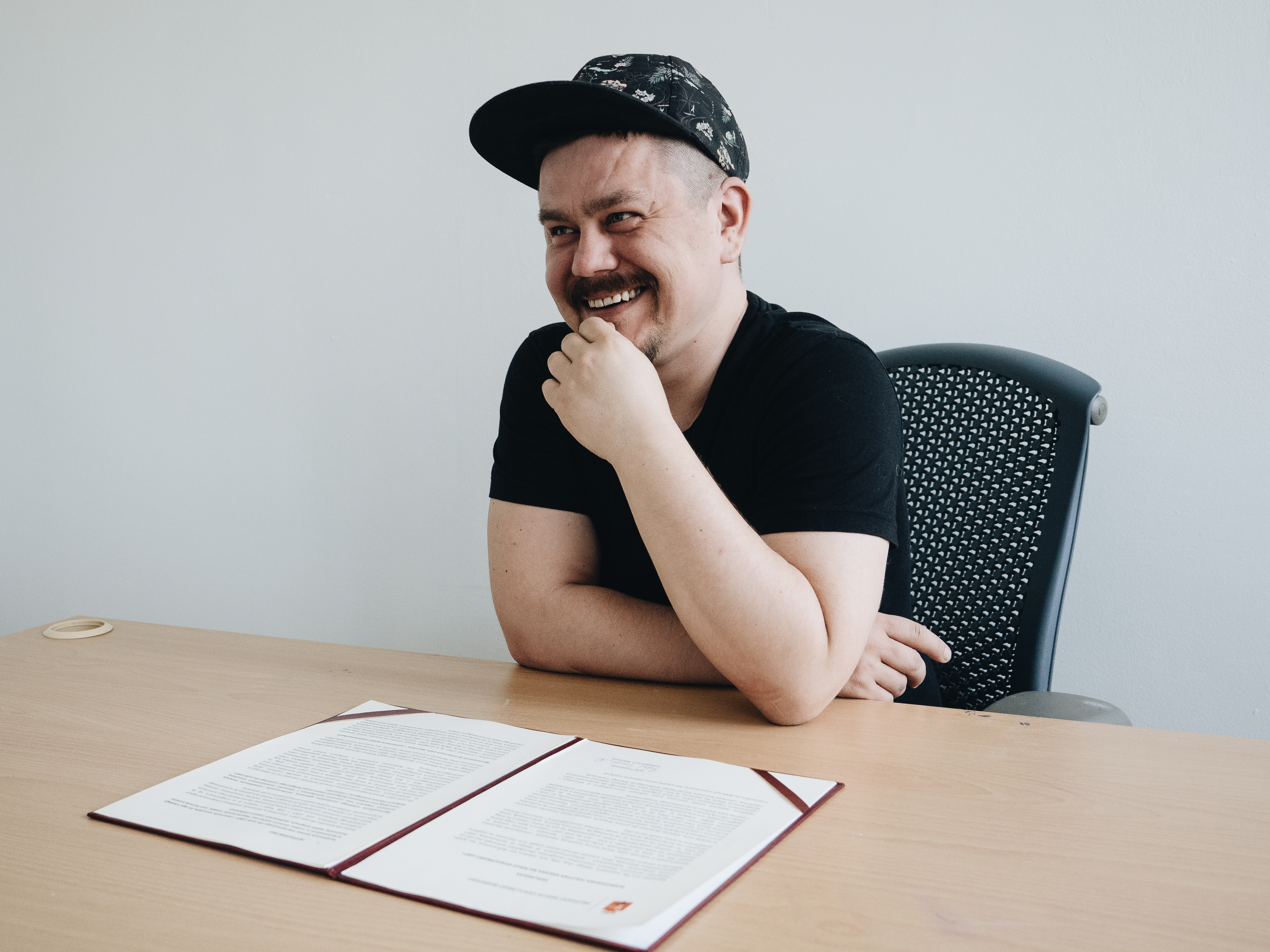
Oktawiusz Chrzanowski moved back to Warsaw and is now involved in the organisation Miłość Nie Wyklucza (Love Does Not Exclude). Photo: © Ilir Tsouko
Throughout Europe, right-wing populist and extreme right-wing parties are on the rise. In Poland and Hungary, they govern with an absolute majority. Until recently, they were part of Austria’s coalition government, and the same is true of the Progress Party in Norway. France’s Marine Le Pen, leader of the National Rally party, made it as far as the run-off in the country’s presidential race. In Italy, Matteo Salvini recently almost succeeded in establishing his right-wing Lega party as the sole governing party.
Right-wing populist parties are no longer confined to the fringes. They have now advanced into areas where they can actively shape the politics of their respective countries. Protecting minorities is the first duty of any democracy – but it is not a goal pursued by right-wing populists. How does that change the day-to-day work of civil-society actors? To what extent are they still capable of taking action when the state suddenly sees them as a foreign body? While Chrzanowski is fighting in Warsaw for acceptance for homosexuals, Agnes Kalota gives free legal advice to homeless people in Budapest, and Luzenir Caixeta continues to fight for the rights of migrant women in Linz despite losing important funding. These three stories have much in common and reveal something about the state and resilience of Europe’s democracies.

Oktawiusz Chrzanowski has become the face of the LGBTQ community in Warsaw. His style is one of the many things that makes Chrzanowski stand out in Polish society. Photo: © Ilir Tsouko
On a sunny Saturday afternoon, Chrzanowski is walking through the streets of Warsaw in red shorts and carrying a jute gym bag on his back. A flower-patterned black baseball cap shades his husky-blue eyes. Chrzanowski has become the face of the city’s LGBTQ community. He works for an NGO called Miłość Nie Wyklucza (Love Does Not Exclude). It’s Easter Sunday and the people walking past him dressed in suits or dresses are on their way to church. In Poland, 86 percent of the population describe themselves as devout Catholics. His lack of religious faith is one of the many things that makes Chrzanowski stand out in Polish society. Yet a lot has changed for Poland’s homosexuals in recent years. When the country joined the EU in 2004, some 94 percent of the population rejected homosexuality. By 2013, that figure had fallen to just 26 percent. The Pride parades are becoming bigger by the year, and when Robert Biedroń was elected in 2011, he became the first openly gay member of the national parliament.
But when the PiS, a right-wing populist party led by Jarosław Kaczynski, won the parliamentary elections in 2015, it cast doubt on every aspect of this progress. Chrzanowski stops in front of an empty square. Until two years ago, it was home to an LGBTQ rainbow made of paper flowers. Right-wing groups burned it down on multiple occasions, and efforts to rebuild it eventually stopped. How can a gay activist compete with his government’s control of the narrative?
When Poland joined the EU in 2004, some 94 percent of the population rejected homosexuality. By 2013, that figure had fallen to just 26 percent.
“We’ve turned it into a question of safety,” says Chrzanowski. He’s attempting to counter the PiS narrative (that presents homosexuals as a threat) with a new one: that of young people being the victims of homophobic violence. He hopes this will trigger change from below, through the urban population that mostly votes for the opposition. During the local elections in April 2018, the mayoral candidates in several of Poland’s larger cities pledged to include the community’s demands in their political agendas. Perhaps the PiS saw this successful tactic as a threat to its power. The government and its supporters responded by running a political campaign in which they declared homosexual and transgender people to be enemies of the state. Kaczynski described the “LGBT ideology” as “a threat to the Polish identity and nation.”
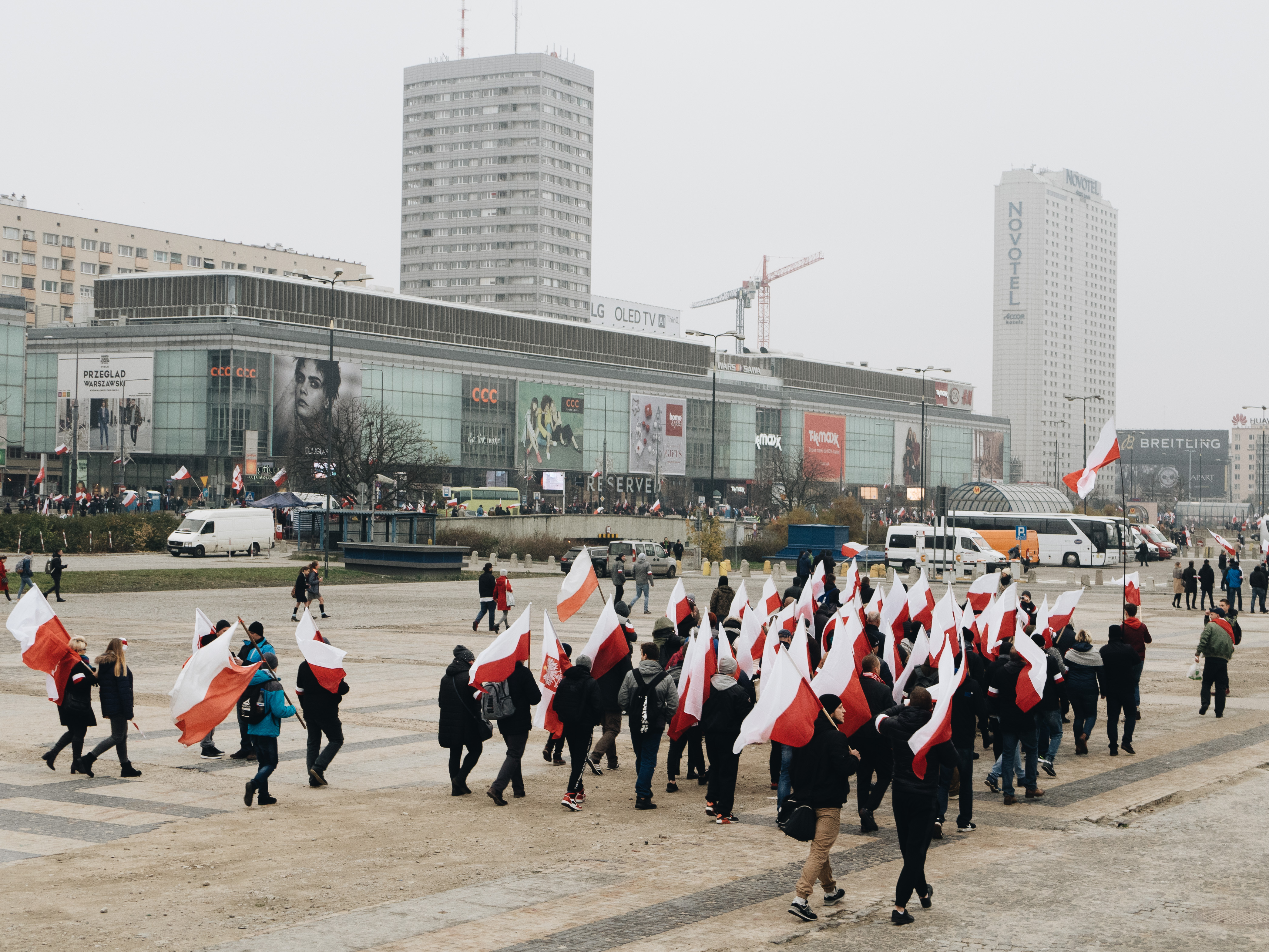
Demonstrators on the way to a rally to mark 100 years of Polish independence. Photo: © Ilir Tsouko
Chrzanowski spent eight months trying to convince Rafał Trzaskowski, the mayor of Warsaw, to get on board. Eventually, he succeeded: on 22 February 2019, Trzaskowski stood on stage at city hall and held up the signed declaration to the cameras. Chrzanowski was standing beside him, smiling. The declaration is the first document to recognise the rights of LGBTQ people in Poland and to lay down specific measures for protecting homosexual and transgender people.
The declaration should provide a basis for introducing concrete measures over the next five years to protect the LGBTQ community. The measures include setting up an emergency hotline and opening a refuge for young people who have had to leave home because of their sexual orientation.
Chrzanowski reaches up to take a wine-red leather folder from the shelf in his office at the NGO. “This is all the work,” he says, flicking through the loose sheets of the declaration. Warsaw didn’t leave him disappointed on this occasion. “The LGBTQ community accounts for ten percent of the Warsaw population. So it’s important that after all these years someone has said: ‘Yes, as an LGBTQ person, you live here too.’” It also showed that civil society doesn’t have to bow to a right-wing populist government. Or it did for a while, at least.
“After the declaration, they started watching us very closely,” says Chrzanowski. His Facebook profile was meticulously searched, and then an article appeared that accused his NGO of pursuing a conspiratorial strategy. “At first it was funny, because we’ve got nothing like a homo-lobby here. Our budget is very small.” But then things started to get frightening. The Polish Bishops’ Conference warned that granting equal treatment to homosexuals and transsexuals would be a threat to European civilization. The PiS also went on the attack. Pro-government media outlets gave airtime to critics who accused LGBTQ activists of molesting children to “make them gay.”
Over summer 2019, the LGBTQ scene replaced migrants as the government’s new bogeyman. And the perpetual campaigning seems to be resonating with the Polish people. A recent survey showed that 46 percent would vote PiS again at the parliamentary elections scheduled for this autumn. Poland is not politically unique in Europe. In Hungary, too, a right-wing populist party (Fidesz) won another round of parliamentary elections last year. This means it can now shape the country as it sees fit –to the detriment of those who have spent years advocating for the socially excluded.
On a grey Friday afternoon in April, Agnes Kalota stands on Blaha Lujza square in central Budapest wearing a black dress and a red leather jacket. She sets out a folding table and two white chairs. Kalota is a street lawyer and the square is her office. She provides pro bono advice to homeless people and people facing housing problems. Election campaign booths have been set up in the middle of the square. In May, over 50 percent of Hungarians will vote for Fidesz, the party currently governing the country under Prime Minister Viktor Orbán. Just a few metres away, about 40 homeless people are queuing up at a sandwich counter. And the line keeps getting longer.
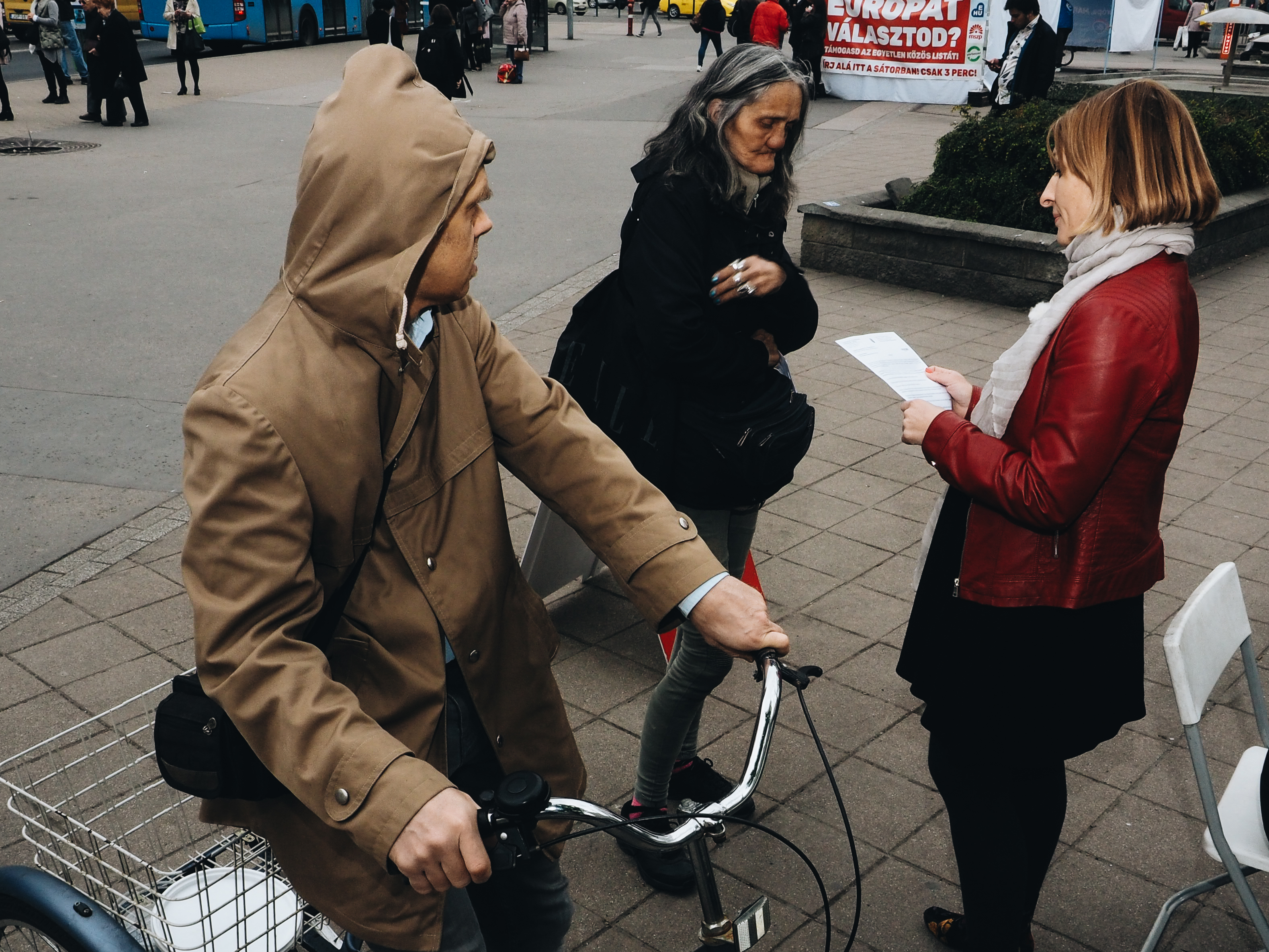
Agnes Kalota is a street lawyer and provides pro bono advice to homeless people and people facing housing problems on one of the main squares in Budapest. Photo: © Ilir Tsouko
Today, Kalota has braved the icy winds to stand on the square and study the letters that people have received from the authorities. Whenever she does this, it is on her own time after a day’s work at her law firm. She’s been doing it for nine years now. Many of her friends can’t understand why. But Kalota knows that a normal lawyer charges between €60 and €300 per hour, and that the people here on the street would never set foot in a normal office – even though, on average, they experience trouble with the law much more frequently. They are arrested because they can’t keep up with repayments after buying a mobile phone or because they took the bus without a valid ticket. Helping these people was a pragmatic decision for Kalota (41): “I just wanted to get involved. I’d have done anything.”
Not everyone who comes to Kalota for help lives on the street. But many feel that they are at risk of ending up there. A woman with dark-brown curly hair and a sleeveless down jacket takes a seat at the small square table and puts her handbag between her feet. Kalota knows her. Etelka came here two weeks ago. She lives in a flat with five other people – her husband, children and grandchildren. They are being evicted in three months’ time.
Before the economic and financial crisis hit in 2008, around one million Hungarian households took out booming Swiss franc loans to buy a house or a flat.
Before the economic and financial crisis hit in 2008, around one million Hungarian households took out booming Swiss franc loans to buy a house or a flat. When the value of the Hungarian currency fell, they could no longer afford their repayments and were forced to sell their homes. On top of that, the rental market was already tight – the cost of renting tripled between 2010 and 2016, while wages stayed the same. Today, one in three Hungarians are classified as poor; they have to survive on less than €256 per month. The government is introducing taxes that benefit top earners, and cutting social benefits and pensions. The state provides more or less no social housing. The housing problem has grown to become a societal problem.
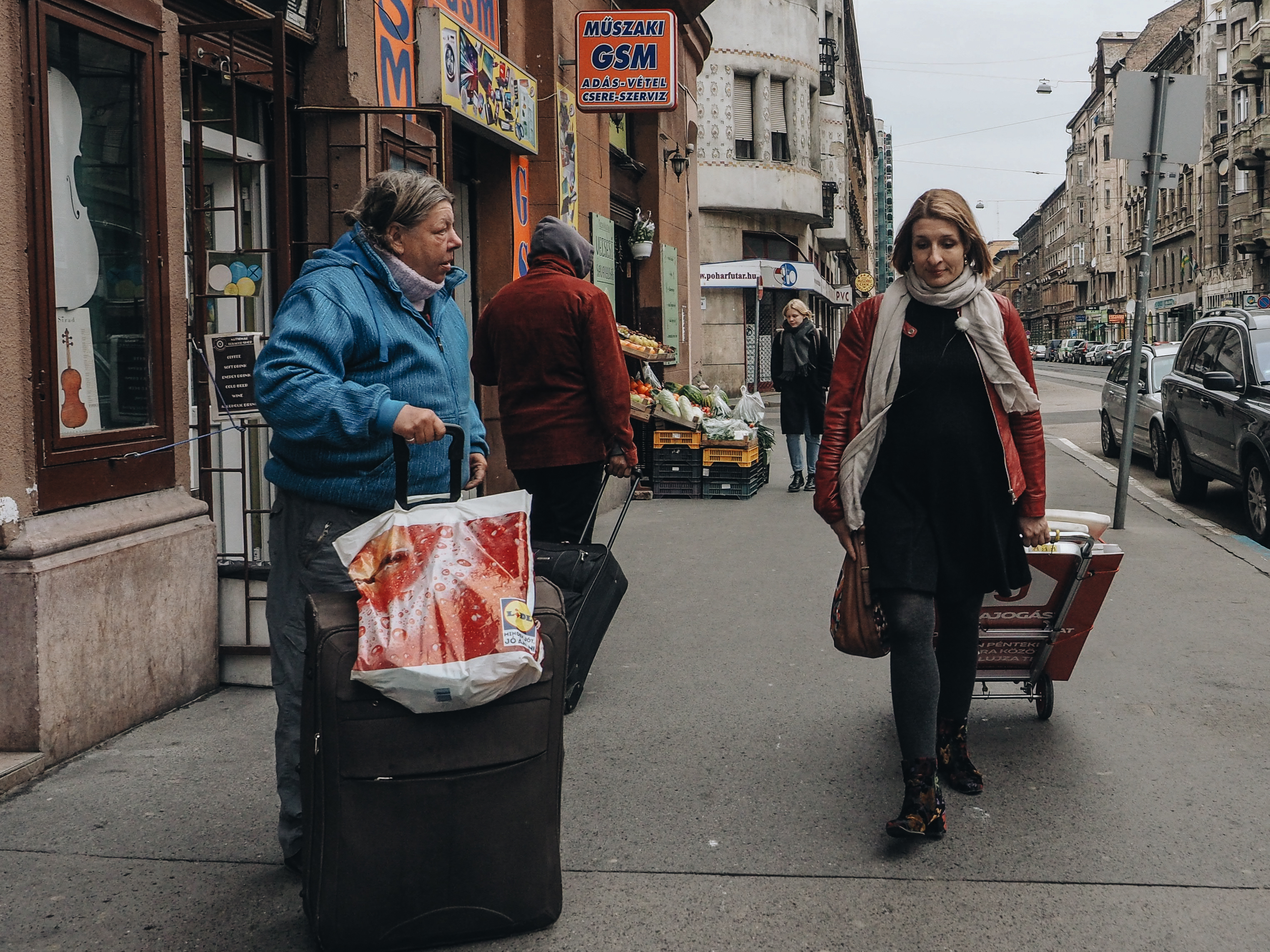
Not everyone who comes to Agnes Kalota for help lives on the street. She knows many of them. One of the women lives in a flat with five other people – her husband, children and grandchildren. Photo: © Ilir Tsouko
“I don’t want to think about it,” says Etelka, referring to losing her flat. She wipes the tears from her cheek with the back of her hand. Kalota is helping her write a letter to the municipal authorities. Etelka carefully copies the printed-out letter onto lined paper using a biro. Kalota, who prepared the letter earlier in her office, stands patiently beside her.
The office that Kalota shares with architects and graphic designers is just a 15-minute walk from Blaha Lujza square, but it’s a completely different world. The office is in an impressive old building with high ceilings and parquet flooring. The clients who come here to consult with Kalota run businesses or own properties. Kalota is a reserved, polite woman. Her father was a Greek Orthodox priest, and she grew up in Budapest during the communist era. She performed well at school, but was regularly in danger of getting in trouble for bad behaviour. She refused to follow rules that made no sense to her. Kalota was eleven when the Iron Curtain fell.
That was more than 20 years ago. Budapest now has a population of around 1.7 million. Official figures say the city has 30,000 homeless people, but experts believe it’s actually 60,000 – more than any other Eastern European capital. Yet homeless people are now at risk of being sent to jail. A new law entered into force in October 2018 that prohibits “habitual residence in a public place.” This even makes it an offence for a homeless person to sit with his or her belongings on a park bench. If that person fails to comply with three consecutive police orders to leave, he or she will be arrested and will appear before a judge within 72 hours. Orbán’s government says that the new law is about saving lives by protecting homeless people from freezing to death. And they did disappear from the city’s squares and underpasses during the winter. But instead of sending them to the shelters – which offer 11,000 beds, a number that civil-society organisations say is far too low – the law is forcing them to the edges of the city, where it is almost impossible for social workers to find them.
Kalota believes that the law punishes people for living on the streets. She says that it violates both the Hungarian constitution and international law. In the weeks after the law entered into force, the street lawyers were in high demand. Their phones rang day and night. A legal hotline offered round-the-clock help for those affected. The volunteers produced a document explaining the changes to the law and handed it out to homeless people. They organized a training session for social workers to inform them about the legal changes and their possible implications, and collected information for lawyers who were likely to be appointed as public defenders. They went to court three times to defend homeless people. Along with other organisations and lawyers, they eventually succeeded in filing a complaint with the Constitutional Court in late November 2018, which stopped the wave of arrests that had begun several weeks earlier.
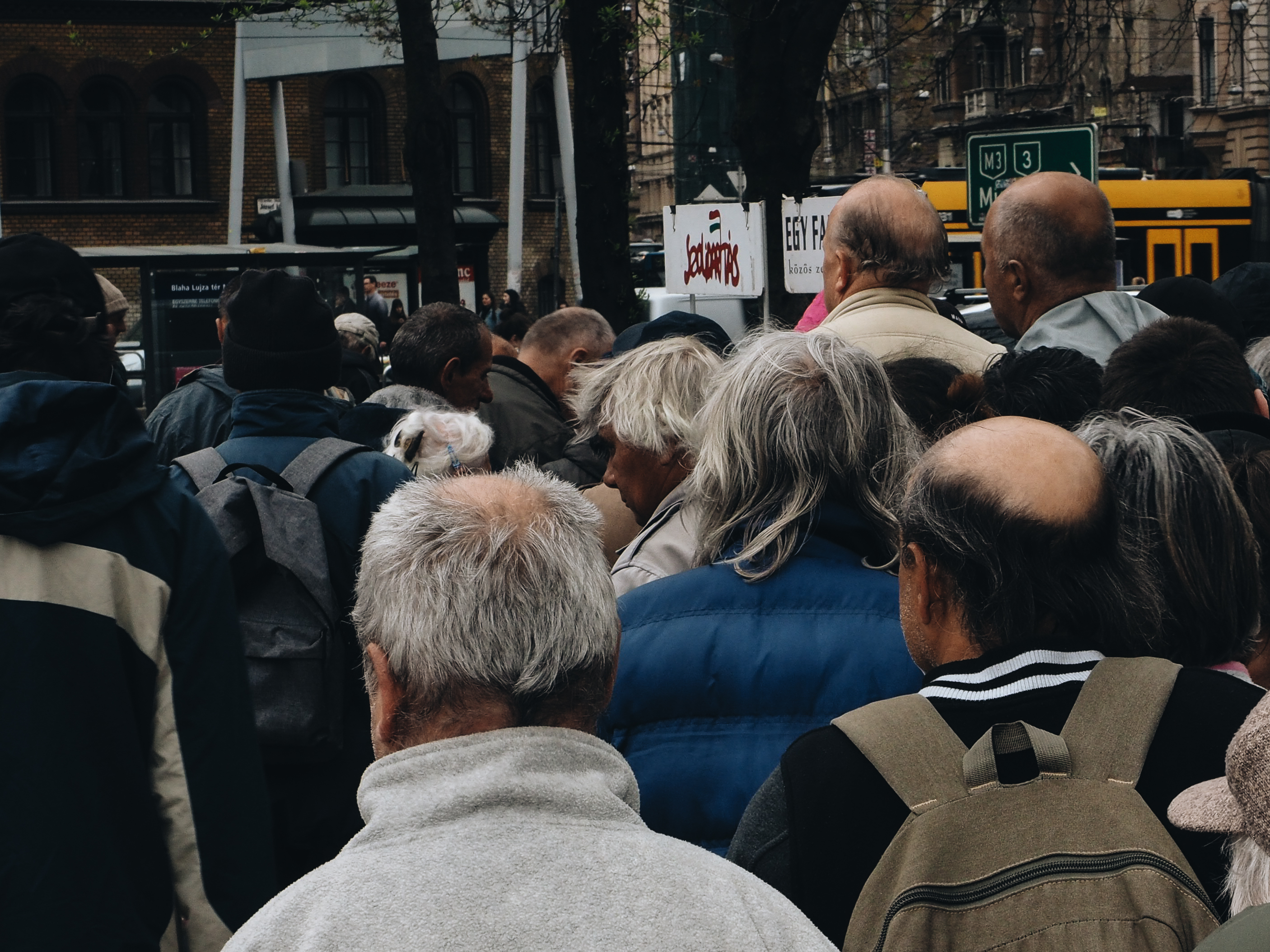
Today, one in three Hungarians are classified as poor; they have to survive on less than €256 per month. The government is introducing taxes that benefit top earners, and cutting social benefits and pensions. About 40 homeless people are queuing up at a sandwich counter. And the line keeps getting longer. Photo: © Ilir Tsouko
“Our government isn’t interested in the weak,” says Kalota. She and her colleagues are the ones who actually do that work. Orbán likes to claim he speaks for the common people. Yet as Hungarian sociologist Zsuzsa Ferge says, he sees himself as the one who is freeing his people from enslavement by international corporations. This is typical behaviour for right-wing populists, says Ferge. They like to dissociate themselves from the elite and trumpet their interest in “the people at the bottom”. In reality, though, they merely look down on poor people.
For years, Orbán has been trying to mould the Hungarian judiciary to fit his own vision – by filling the Constitutional Court with pro-government judges, for instance. Since 2017, non-governmental organisations that receive more than €23,000 in donations from foreign supporters must declare themselves as being “foreign-funded”. The assumption is that these NGOs are working against Hungary and the foreign money is helping them to do so. The Hungarian government has therefore found a way to systematically and apparently completely legally undermine the work of civil society in its own country.
Viktor Orbán likes to claim he speaks for the common people. Agnes Kalota argues: “Our government isn’t interested in the weak.”
Despite this, or perhaps precisely because she would have given up long ago, Kalota is placing all of her hopes in the Hungarian rule of law. “Maybe I’m naïve, but I cannot believe that a court like this – a court that serves people who work to protect the constitution, human rights and international law – will accept this,” says Kalota, referring to the law that prohibits homeless people from staying in public places. The Constitutional Court’s decision will therefore be a test for democracy in Hungary. If the law passes, Kalota believes that many of her clients will go to jail. Too many. “It means we would no longer be in a position to deal with the situation.”
Obviously, the 18 months that Austria was governed by a coalition between the People’s Party (ÖVP) and the Freedom Party (FPÖ) is not comparable with the situation in Hungary, which is nine years into a Fidesz government and is now described as an illiberal democracy or authoritarian system. And yet Orbán, too, started out by silencing critical voices.
In Linz, a four-hour drive from Budapest, Luzenir Caixeta is pushing her way through the pedestrian zone towards the main square, surrounded by a crowd of people. She and her fellow protesters are holding up pink placards that read “Oppressed but not defeated”. Caixeta is a bright woman with short hair and freckles. Growing up in a large family, she had to learn early on how to assert herself. Even back then, she fought back when she was treated differently to her brothers. As a young woman she studied philosophy and theology in São Paolo and devoted her spare time to working with women’s groups in the favelas. Caixeta says that when she sees how much other people are struggling, she feels that she has no right to complain and that she should use her position to help others secure their rights.
For 25 years, the organisation maiz has been fighting for better living and working conditions and for political and cultural participation for migrant women in Austria. Help is provided in the form of German and IT courses, cultural and research projects, and multilingual advice. Problems addressed include domestic violence and issues with rights of residence. Yet maiz has been under pressure for a number of months now.
Shortly before Christmas 2017, with many of her colleagues already home for the holidays, Caixeta was unexpectedly asked to attend a meeting at the Department for Women’s Affairs of the State of Upper Austria. There, she was told that the department was cancelling maiz’s funding of €28,500. The official who gave her the news said that it was due to political decisions. Just a few weeks later, the Health Department also removed its funding of €13,400. Suddenly, maiz was short of €42,000 – a fifth of its budget.
Shortly before Christmas 2017 Caixeta was unexpectedly asked to attend two meetings. Suddenly, “maiz” was short of €42,000 – a fifth of its budget.
At the time, both departments were overseen by Christine Haberlander, an ÖVP member of the state government. She said the cancellations were necessitated by a ten-percent cut in the overall budget, and that the new funding criteria meant that the association’s work now fell outside the core business of the Department for Women’s Affairs. The advisory services provided by maiz were, Haberlander said, “too specific”. Caixeta shakes her head in disbelief, explaining that the specific service is precisely what makes maiz so unique. Many women, she says, are reluctant to go to a general women’s advisory centre where they only encounter white Austrian women and don’t feel as if their needs are understood.
Belky, a young woman with a friendly smile and her dark hair tied up in a ponytail, sits at a desk in the entrance hall of an office in Linz. Holding a phone to her ear with one hand, she uses the other to scroll patiently through the advisory centre’s appointment calendar. The next few weeks are almost full. Anyone looking for an appointment now will have to wait up to two weeks. To save money, the association has made staffing cuts. Caixeta, for instance, now only works part time – but the time that she invests in maiz hasn’t really changed.
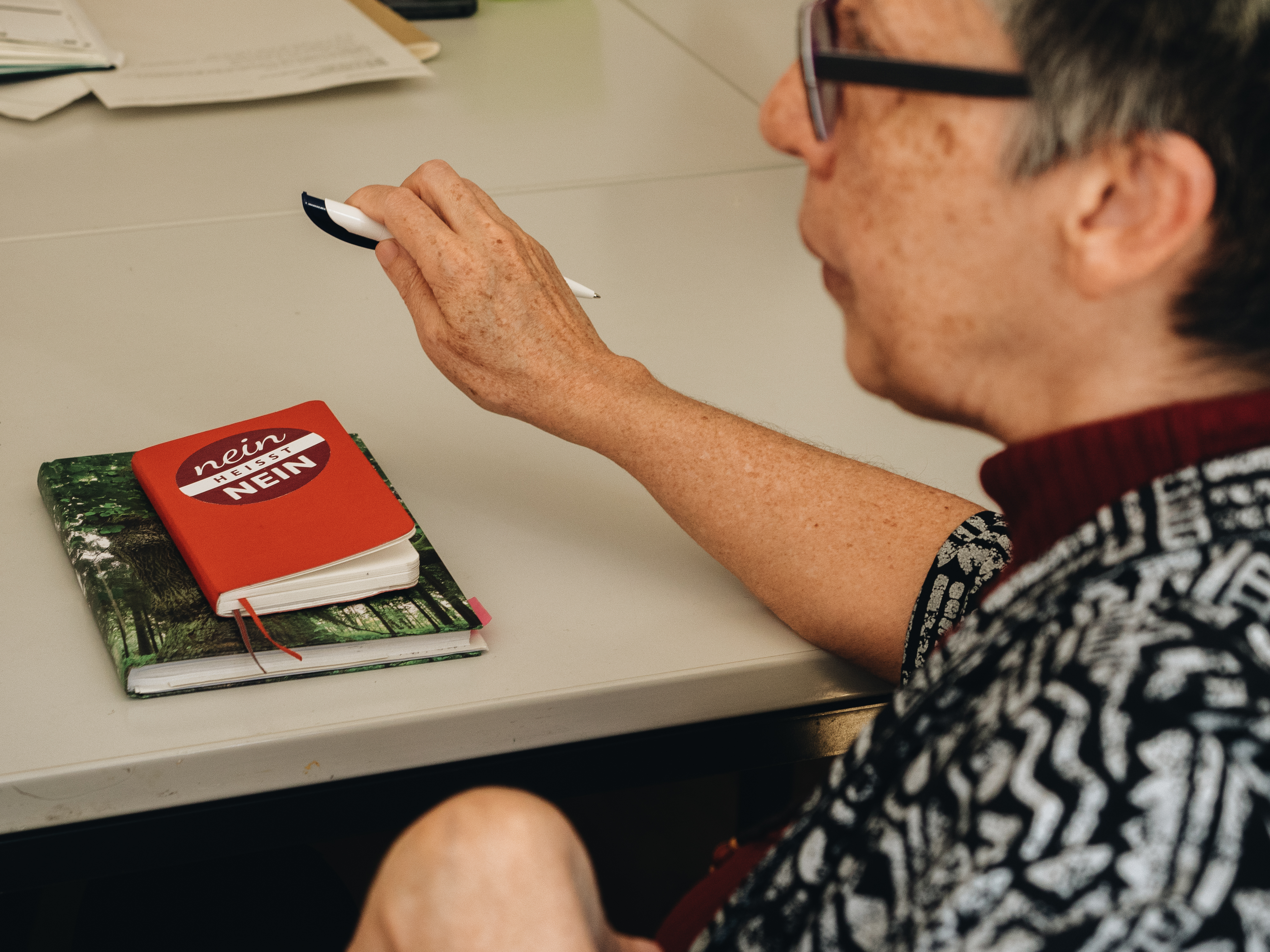
Across Europe, governmental organisations are coming under pressure. Right-wing populist parties are systematically weakening civil society. But Caixeta knows that experiences like this gave them a boost: “I think that there is a particular need for civil society to actively play its part.” Photo: © Ilir Tsouko
She and her colleagues spoke to journalists and wrote an open letter, but it did nothing to change the decision of the Upper Austria authorities. Yet hope was not lost: the women managed to replace the missing funding by collecting donations at solidarity events. Experiences like this gave them a boost. “I think that there is a particular need for civil society to actively play its part,” says Caixeta.
In summer 2018, under the ÖVP-FPÖ coalition, the federal-level Department for Women’s Affairs also withdrew and reduced funding to more than 20 women’s organisations. These organisations were now facing a situation that was already a reality in Upper Austria. The then women’s minister Juliane Bogner-Strauß (ÖVP) said the cuts were due to funding restructuring. In total, women’s institutions lost €700,000. It later turned out that this was the same amount that the Ministry for Women’s Affairs contributed to the ÖVP’s family festival on 1 May 2019 at Schönbrunn palace.
Political scientist Birgit Sauer of the University of Vienna is not surprised that associations like maiz have lost their funding. The organisations are part of a critical public that can oppose the antiliberal, antidemocratic, antifeminist trend in Austria. If they disappear, says Sauer, it would be a problem for democracy.
Caixeta believes that, contrary to what the government says, its women’s policies are not equally targeted at all women. She says the cuts mean that support is being taken away from the women who need it most – those who are affected by racism and precarious conditions, and are therefore doubly disadvantaged. Caixeta says that women are also experiencing it in their day-to-day lives. Migrant women, for instance, are more frequently reporting verbal abuse on the streets of Linz. And the attacks often go further than just words. In a recent incident, a black woman waiting in a supermarket queue was elbowed in her stomach. She was pregnant. Many women are staying at home out of fear. Caixeta says that maiz is needed now more than ever.
Across Europe, non-governmental organisations are coming under pressure. The fact that right-wing populist parties are no longer just an opposition worthy of ridicule and are increasingly involved in governments means that they can actively shape Europe and use legal avenues to systematically weaken civil society’s ability to preserve a Europe that is based on human rights. And as if it wasn’t hard enough for minorities to oppose the status quo, the state is now also actively harassing and criminalizing those who do.
When participants at a Gay Pride parade in Poland in mid-July were attacked and chased by hooligans throwing bottles and firecrackers, it marked the culmination of an escalating offensive against a liberal Poland. Chrzanowski was at the parade. But despite the attacks, it was the first Gay Pride parade to be held in Białystok, a city of 300,000 in north-eastern Poland close to the Ukrainian border. Parades are now starting to take place outside major cities such as Warsaw and Krakow. Above all, this shows that the LGBTQ community is no longer willing to hide. Chrzanowski believes that society has moved forward, and that this is going to be problem for the PiS in the long term.
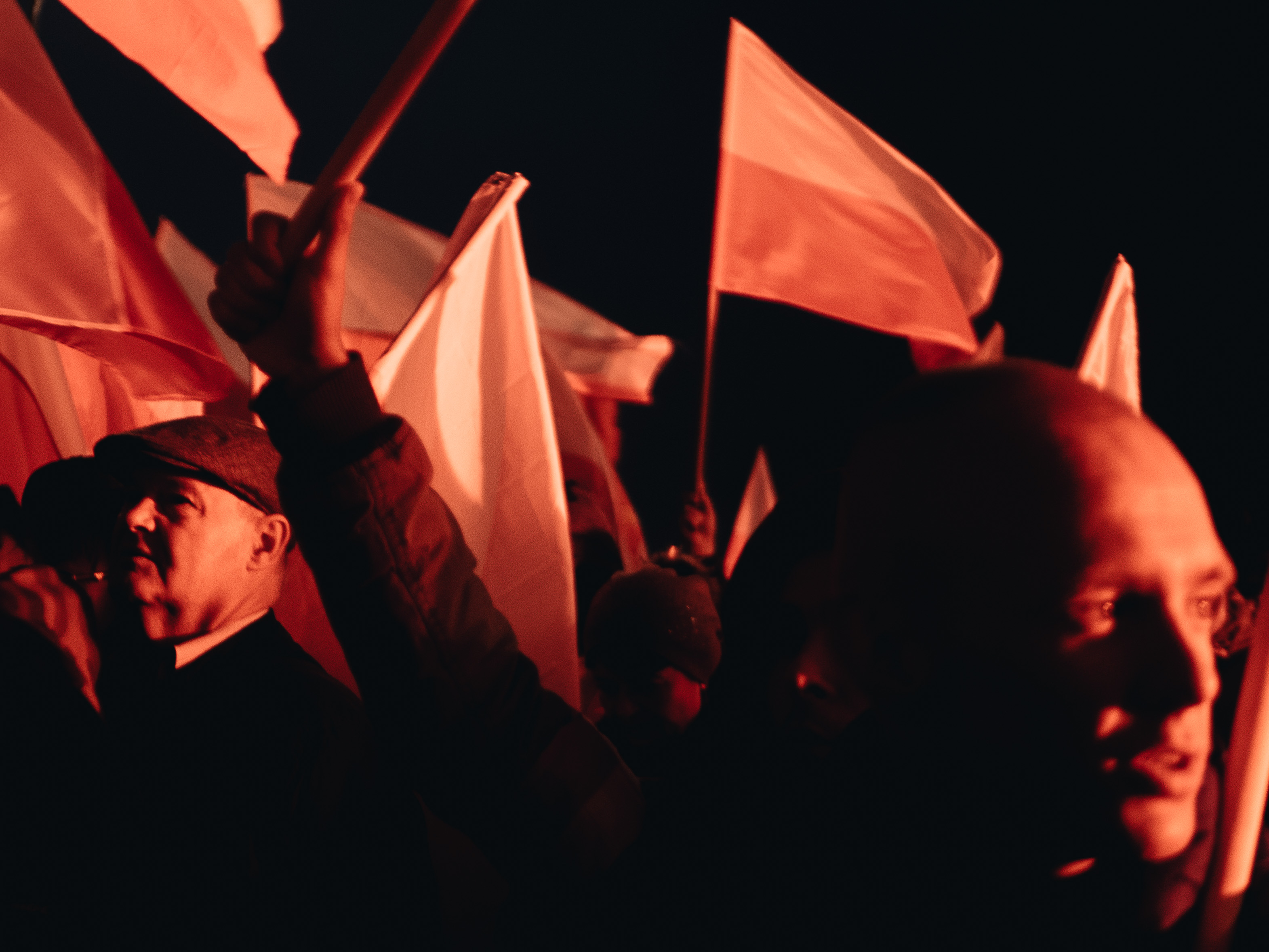
Rally on the occasion of 100 years of Polish independence. The governing party PiS is running a political campaign in which they declared homosexual and transgender people to be enemies of the state. Kaczynski described the “LGBT ideology” as “a threat to the Polish identity and nation.” Photo: © Ilir Tsouko
“We have huge opportunities to change the situation here. The Warsaw declaration on the rights of LGBTQ people has strengthened us,” says Chrzanowski. Last summer, a colourful water installation lit up Saviour Square in Warsaw – the place where the paper rainbow was burned down in previous years. The new rainbow can’t be so easily vandalized.
In early June, Agnes Kalota is sitting in the street lawyers’ office in Budapest with a colleague. They’re supposed to be having their weekly meeting, but they stop every 20 minutes to refresh the Constitutional Court’s website. And then the judgement appears: the law making homelessness illegal is consistent with Hungary’s constitution.
A month and a half later, Kalota is back in court. Six months after she and her colleagues stopped the arrests, police officers have begun apprehending homeless people again. Something else has changed, too: Kalota is pregnant, the bump visible under her black lawyer’s robes. Kalota was disappointed by the ruling. She is increasingly thinking of leaving Hungary. She loves her country and Budapest. Her family is here and she would like her son to grow up here. But if things get any worse, she won’t hesitate to leave. “I want my son to live in a country where he has air to breathe, where he can be free. A country that represents the values I believe in.”
In Austria, the women’s associations that suffered budget cuts in 2018 also had to survive 2019 on a smaller budget. That includes maiz. And since the funding budget has been used up, the transitional government won’t be able to change things, either.
Original in German. First published in October 2019 in DATUM.
Translation into English by Jen Metcalf.
This text is protected by copyright: © DATUM / Lena von Holt. If you are interested in republication, please contact the editorial team.
Copyright information on pictures, graphics and videos are noted directly at the illustrations. Cover picture: Luzenir Caixeta, Oktawiusz Chrzanowski und Agnes Kalota. Three civil rights activists who are fighting moves to curtail our freedom. Photo: © Ilir Tsouko